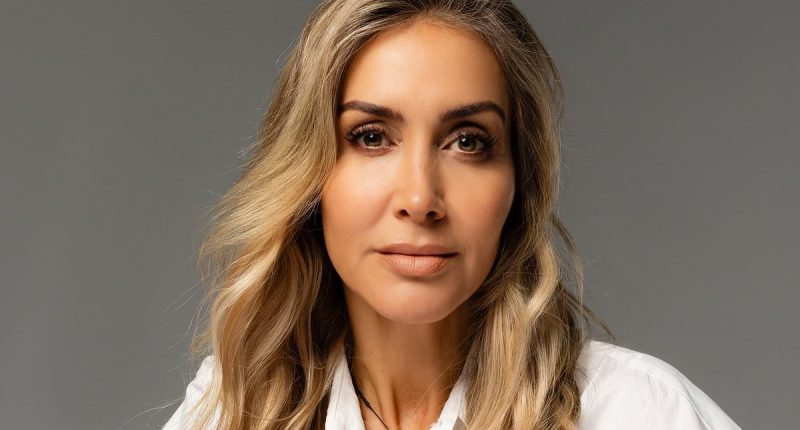Share this @internewscast.com
Sarah* didn’t wake up in a stranger’s bed, nor did she vomit on the Uber driver.
She knew she didn’t need to check her phone in the morning and cringe at the abusive texts she’d sent to colleagues. She didn’t even need a Panadol. There was no drama, no tragedy, no sirens, no clink of handcuffs.
It was just one glass of Pinot Noir.
She was out shopping at the supermarket one evening when she noticed the clattery bar next door.
‘I went in, almost subconsciously, sat down, ordered a Pinot, drank it, and went home,’ she told me.
‘It was really as simple as that.’
Harmless? Boring, even? Why am I even telling you this?
Because, like me, Sarah has called herself an alcoholic for six years. And now she says she is drinking again.

I’ve been sober for six years. Now, one of my friends in recovery is giving ‘moderation’ a go
We met in recovery meetings, bonding over a shared sense of anxiety and shame about our out-of-control drinking.
We recovered together, religiously attending meetings, week after week, month after month, year after year, slowly rebuilding our lives.
One day at a time.
We celebrated our sober milestones together, enjoyed wine-free outings to coffee shops and shopping centres, marvelled at how clear our skin looked, how miraculous eight hours of sober sleep felt.
There was no doubt about it: we were both so much happier after cutting out the demon drink.
And as two women living in the eastern suburbs of Sydney, where ‘wines and lines’ is a socially acceptable activity, we wore our sobriety like badges of honour.
Yet now Sarah was telling me she had discovered ‘moderation’ – a foreign concept to both of us years earlier. The fact we had found moderate drinking so impossible was the very reason why we had concluded it was better to abstain altogether.
After that first glass of wine, she’d had a few more glasses in social settings in the weeks that followed. She told me she felt happy and in control.
At first, I wasn’t worried about her. I even wondered if ‘moderation’ might be possible for me, too. Maybe we were different from other women we’d met in those meetings?

When I met Sarah* in recovery, ‘moderation’ was a foreign concept to both of us
In recovery, we’d heard women confess to morning drinking, secret bottle shop runs, hiding liquor in pushchairs and desk drawers. Those were things neither of us had ever done.
One woman even wept as she admitted to drinking hand sanitiser to stop her shakes.
We didn’t judge her – but that had never, ever been us.
Sarah and I had been high-functioning, middle-class mothers whose lunchtime Sav Blanc habit had grown toxic, threatening to sabotage our otherwise ordered lives.
My drinking had escalated at a stressful time in my life when I was living with undiagnosed bipolar disorder.
During that time, I wrote bestselling books and went to the gym every morning. It wasn’t exactly what you would call a downward spiral.
Not all alcoholics end up in handcuffs. Personally, I got sober because I was ‘sick and tired of being sick and tired’ – a saying I hear often in recovery.
That was enough for me to want to get help.
Sarah’s story was similar. Her rock bottom wasn’t a trip to ER, a bitter divorce or losing her job. It was one too many queasy mornings, the bags under her eyes and the embarrassment of taking out a recycling bin clinking with wine bottles.
In recovery, it was drummed into us that if we ever drank again, we would probably die, kill someone by drink driving, or end up in hospital or an institution.
It’s a fear we needed to have – even if our worst-case scenarios tended to be hangovers, hazy memories of the night before, and the odd morning apology text.
When Sarah told me her secret – yes, ‘moderate drinking’ really is a dirty little secret in our community – I started to look at alcoholism differently.
Sarah had picked up a drink a month ago and nothing bad had happened.
Admittedly, nothing particularly good had happened either – but Sarah’s story made me question everything I had been told about our disease, as some like to call it.
Here’s what I’ve concluded: there could be two types of female alcoholic.
There’s the classic one. The alcoholic whose life implodes because of her drinking. She might lose her job or custody of their children, end up homeless or in prison.
I know plenty of women like this. Alcoholism is one of the biggest killers out there, it’s progressive, and to make light of it is dangerous and extremely irresponsible.
They simply cannot drink. One is too much. A single sip triggers a relapse.
But then there are the women like me, like Sarah, the slow burners, the ones who can maybe have one or two drinks – and maintain this for weeks, months, years.
But even for us, this drinking can only stay moderate for so long. We realise, one day, that two drinks in one sitting becomes three, then four. Again, not catastrophic, but enough of a slow escalation for us to realise we’re heading in the wrong direction.
Sarah’s story is a dangerous one. Relapse isn’t always an immediate disaster, yet for many ex-drinkers, picking up that first glass is like setting fire to their lives again.
Now that I’m medicated for my bipolar and in a more stable place in my life, it is tempting to believe I could drink in moderation.
Perhaps I could. But it’s not worth the gamble. I wouldn’t ever want to bet my life on the chance I’m one of the few alcoholics who can safely return to moderate drinking.
I’ve worked too hard to get here. I’ve cleaned up my act, my sparkle and joy has returned and I never want to let it go again – not for the sake of a few sociable wines.
So my friend Sarah might be fine for now, a few weeks into her moderate drinking lifestyle. She may feel more connected to others, more ‘fun’, even.
But what if next week, next month or next year she isn’t feeling fine? What if she is stressed or anxious and picks up a drink to calm the forces raging inside her.
Suddenly, she’s self-medicating again.
If you’re reading this, wondering if maybe you can drink again, ask yourself: What are you actually hoping to get from it?
Sarah’s world didn’t fall apart, sure. But, by her own admission, the odd Pinot Noir hasn’t transformed her life for the better either.
Drinking would add nothing to my life and only risks disrupting the peace I’ve worked for years to reclaim. I wouldn’t chance it for all the money in the world.
* Name has been changed. Sarah has given Amanda Goff permission to share her story under a pseudonym.













